#SDG1
Explore tagged Tumblr posts
Text
World Day of the Poor!
Let's come together to uplift the lives of the marginalized. On this World Day of the Poor, let's pledge to be a beacon of hope and compassion. Your small act of kindness can make a big difference.
Join Us : https://www.motherteresacharities.org/
Donate Now : https://www.motherteresacharities.org/donations.php
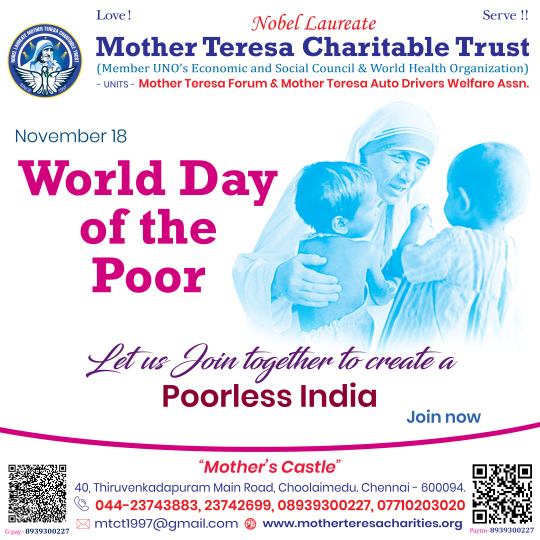
#WorldDayOfThePoor#PovertyEradication#SocialJustice#Charity#Donate#HelpingHands#KindnessMatters#GiveBack#Humanity#TogetherWeCan#share#elonmusk#trendingreels#instagramreels#facebook#facebookpost#vijaythalapathy#facebookviral#FacebookPage#instagram#EndPoverty#GlobalGoals#SDG1#PovertyReduction#SocialImpact#CommunityEngagement#Empowerment#Hope#ChangeMaker#WorldWithoutPoverty
0 notes
Text
Remittances helps families to achieve their own Sustainable Development Goals.

By 2030, it is projected that over US$ 5 trillion will be sent home by migrants to low- and middle-income countries (LMICs), with much of this money going directly to rural areas where 80 per cent of the world’s poor live, face food shortages, and the impacts of climate change.
This money, sent by migrants and diaspora communities, directly supports millions of families to achieve their own Sustainable Development Goals (SDGs). They contribute directly to poverty alleviation, education, healthcare, small business development, gender equality, and rural economic growth.

#sustainable development goals#sdgs#sdg1#sdg4#SDG8#sdg10#sdg2#sdg3#sdg5#sdg6#sdg7#sdg13#sdg15#sdg16#sdg17#financial contribution#financial services and products#agenda 2030#united nations department of economic and social affairs (undesa)#financial inclusion
0 notes
Text
Financing for Sustainable Development Report 2024 - Financing for development at a crossroads.
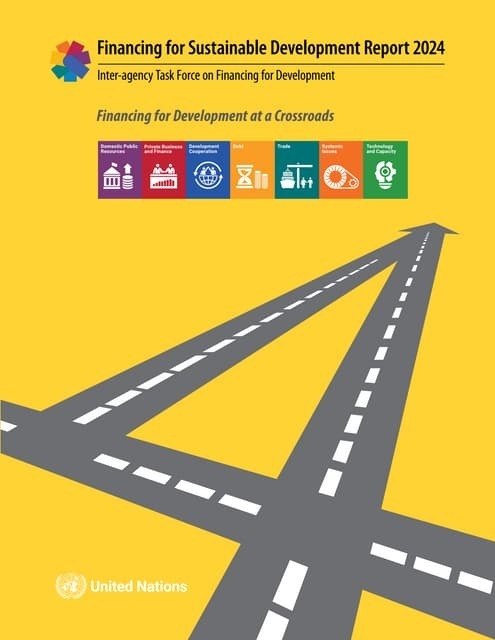
United Nations Department for Economic and Social Affairs
#united nations department of economic and social affairs#sustainable development goals#financing for development#agenda 2030#globalgoals#economic growth#sdgs#sdg1#sdg2#sdg3#sdg4#sdg5#sdg6#sdg7#sdg8#sdg9#sdg10#sdg11#sdg12#sdg13#sdg14#sdg15#sdg16#sdg17
0 notes
Text
Alleviating Food Hunger and Reducing Food Waste with Innovation.

“Food waste is this massive and very overwhelming challenge, but itʼs actually something that every single one of us can start to address in our own homes,” Shukla says, noting how shocked she was when she first learned how much of the worldʼs food supply spoils on a daily basis.

“The worldʼs farmers actually grow enough food to feed everyone on the planet, but over 800 million people still go hungry every single day.” While the food waste challenge is daunting, she also sees it as an opportunity to prove how small innovations can make a big difference. Her journey started early and is a story of simple beginnings and empowerment. When visiting her grandmother in India as a 12-year-old, Shukla drank water believed to be contaminated, but thanks to her grandmotherʼs homemade remedy, she didnʼt get sick. She was intrigued and began studying her grandmotherʼs remedy, and was able to figure out why it worked and how to replicate and advance its effects. She now uses this knowledge to prevent food spoilage and relieve hunger around the world. Shukla holds four US patents and an Index Design to Improve Life award, a leading international prize for design. Her product is used by farmers and families across the globe, and Freshglow has also partnered with retailers such as Whole Foods and Walmart.
Alleviating Food Hunger and Reducing Food Waste with Innovation
youtube
IP at Work

0 notes
Text
Tourism and Rural Development: A Policy Perspective.
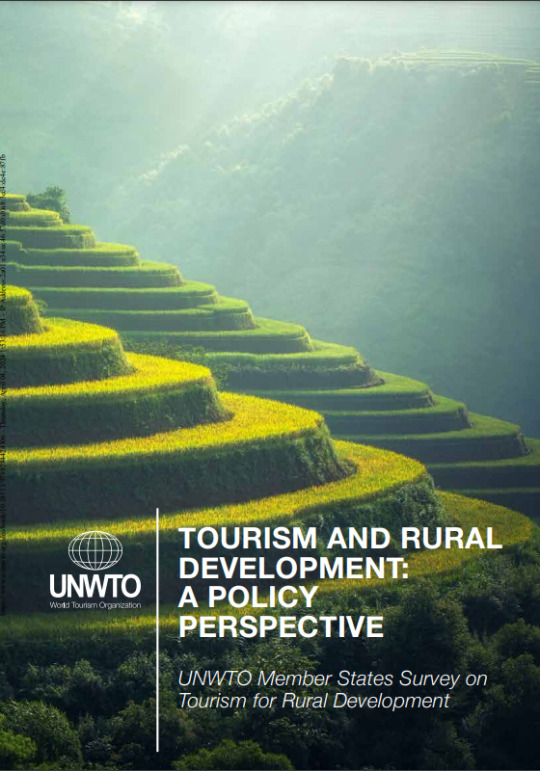
Tourism has high potential to stimulate economic growth and social change in rural areas because it contributes to local economies, support other products value chains, distributes benefits across both seasonal and geographic grounds, and promotes the conservation of cultural and natural heritage. Through the UNWTO Tourism for Rural Development Programme, the Organization seeks to enhance these and other opportunities that tourism can bring to rural areas. To devise adequate actions and develop impactful initiatives, it is essential to have solid knowledge and data to help support and monitor the evolution of this important agenda.
#: rural tourism#Tourism policy#support mechanisms#investment#entrepreneurship#good practices#planning#opportunities and challenges#Tourism sector#tourism economy#social cohesion#environmental#cultural exchanges#natural ressources#livelihoods#cultural heritage#tourism infrastructure#connectivity#digitalization#tourism products#tourism prospects#future of tourism#sustainable development goals#unwto#Rural tourism#rural areas#sdgs#globalgoals#sdg1#sdg8
1 note
·
View note
Text
Financing social protection and care systems for the fulfilment of human rights, gender equality and poverty reduction (CSW68 Side Event).
UN Women is convening a high-level panel of diverse leaders for this CSW68 side event to explore how financing social protection and care systems can realize human rights, promote gender equality, and eradicate poverty amidst multiple crises.
Social protection and care systems are recognized as crucial tools to combat poverty (SDG1), ensure universal health coverage (SDG 3), and promote human rights and gender equality (SDG 5). However, cascading crises such as the COVID-19 pandemic, environmental emergencies, and conflicts have reversed progress on poverty eradication and gender equality, leaving 1 in 10 women in extreme poverty and triggering a cost-of-living crisis amid a looming debt distress. These shocks are intensified by underlying structural crises in jobs, livelihoods, and care. If current trends continue, by 2030, an estimated 8% of the world's female population – 342.4 million women and girls – will still be living on less than $2.15 a day. Against this backdrop, UN Women's corporate side event will explore how social protection and care systems can advance human rights, gender equality, and poverty eradication. As the world prepares for the 30th anniversary of the Beijing Declaration, the event aims to accelerate progress in expanding social protection, strengthening resilience, and integrating social protection with employment and livelihoods. Additionally, this event seeks to bridge thematic linkages between the priority theme of CSW68 'Accelerating the achievement of gender equality and the empowerment of all women and girls by addressing poverty and strengthening institutions and financing' with a gender perspective and the review theme on 'Social protection systems, access to public services and sustainable infrastructure for gender equality and the empowerment of women and girls.'

#access to care services#care economy#caregiving responsibilities#financing for gender equality#side events#women's empowement#sdg1#sdg3#sdg5#un women
0 notes
Text
Fighting Poverty: The ADDS policies and programs (CSocD62 Side Event).
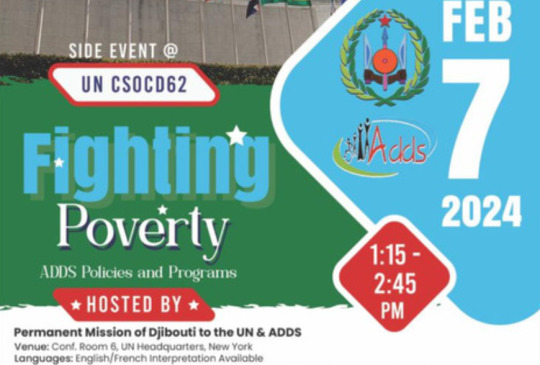
This side event, organized by the Permanent Mission of Djibouti to the United Nations with ADDS , aims to provide an overview on policies and good practices in Djibouti in the implementation of Goal 1 in the Sustainable Development Goals of the 2030 Agenda in Djibouti. As a member of the Commission, Djibouti intends to highlight its contributions to the CSocD 62.
0 notes
Text
Opening plenary (SDG Action Weekend, Mobilization Day).
As the opening to SDG Action Weekend, the opening plenary of the Saturday proceedings will emphasize the urgency of this moment. Halfway to the 2030 Deadline, we are not halfway there –many goals remain off-track and global economic, geopolitical, and environmental headwinds threaten progress in other areas.
The 2030 Agenda is a promise, not a guarantee, and humanity is in the hotseat. In the face of these challenges, participants will be reminded by speakers that transformation, at scale, is possible. We have the right tools and capabilities but now we need everyone, individually and collectively, to channel these resources more efficiently to deliver on the SDGs. This session will feature a keynote speech from a former Head of State, providing a sober reality check of the moment and emphasizing the possibility for us to achieve our promise. To close, an empowering performance from Yemi Aladewill set an uplifting tone as stakeholders head into the programming of SDG Mobilization Day.
---
To maximize the SDG Summit's impact, the Secretary General is convening an SDG Action Weekend, which will generate opportunities for stakeholders, UN entities, and Member States to convene inside the United Nations Headquarters and set out specific commitments and contributions to drive SDG transformation between now and 2030.
The SDG Action Weekend will consist of the SDG Mobilization Day on Saturday, 16 September, and the SDG Acceleration Day on Sunday, 17 September at UNHQ in New York.
The SDG Mobilization Day (16 September) will create an opportunity for stakeholders from all sectors to convene inside the United Nations Headquarters and mobilize towards an ambitious SDG Summit and UN General Assembly High-Level Week.
The SDG Acceleration Day (17 September) will be centred around the UN High-Impact Initiatives
The SDG Summit on 18-19 September will mark the mid point of the SDGs. It must secure the breakthroughs and momentum needed to change course and achieve the SDGs by 2030. To maximize the Summit's impact, the Secretary General is convening an SDG Action Weekend, which will generate opportunities for stakeholders, UN entities, and Member States to convene inside the United Nations Headquarters and set out specific commitments and contributions to drive SDG transformation between now and 2030.
#sdg1#sdg2#sdg3#sdg4#sdg5#sdg6#sdg7#sdg8#sdg9#sdg10#sdg11#sdg12#sdg13#sdg14#sdg15#sdg16#sdg17#globalgoals#sustainable development goals#stakeholders#sdg action#opening plenary#plenary session
0 notes
Text
Roundtable 1 - For people's well-being.
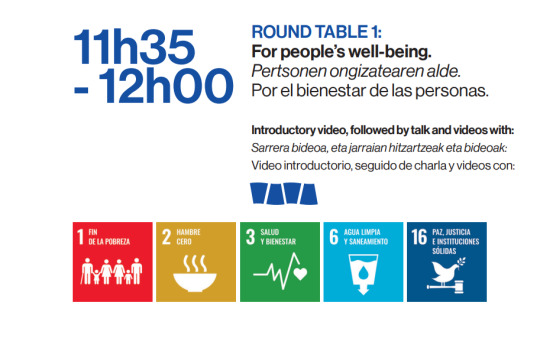
International Day of Cooperatives 2023 "Cooperatives: Partners for Accelerated Sustainable Development."

0 notes
Text
Celebrate International Tea Day 2023 with us under the theme “Bringing people together over a cup of tea”.

This year, theme is "Bringing people together over a cup of tea''; The observance of the International Tea Day 2023 will focus on smallholder tea producers. The Day aims to raise awareness of the deep cultural, heritage and economic significance of tea around the globe.
The observance of the International Tea Day aims to raise awareness of the key role the sector plays in reducing extreme poverty (SDG1), fighting hunger (SDG2), empowering women (SDG5), supporting the sustainable use of the terrestrial ecosystem (SDG15), and in contributing to the achievement of the 2030 Agenda for Sustainable Development.
#SDG1#SDG2#SDG5#SDG15#SDG13#Bringing people together over a cup of tea#Livestream#FAO#Teaday#international tea day#tea growers#tea industry#tea consumers
0 notes
Text
About Ageing populations.

Declining mortality and fertility rates have resulted in rapid ageing with World Population Prospects indicating that by 2030 nearly 12 per cent of the world population will be 65 years of age or older. By 2050 an average longevity globally is to reach around 77.2 years of age. As population grows older, dependency rations increase adding pressures on social security and public health systems. With longer life spans come higher risks of non-communicable diseases and diminished physical capacity leading to higher care needs. The demand for long-term care is rapidly increasing in many countries with care models relying on families increasingly insufficient.
Meeting of the SDG target 1.3 on old age pensions is not only crucial for older persons but for family well-being overall, especially in the context of extreme poverty and household vulnerability with old age pensions helping to strengthen household’s capacity to care for older persons. Questions of intergenerational equity in an ageing world need more attention in preparation for the Sustainable Development Goals Summit and the Summit for the Future.
Strengthening of intergenerational solidarity is key if we are to tackle the challenge of ageing effectively. With rapid demographic changes responsive policies are needed to safeguard the well-being of families and all its members. While the world is shifting towards older populations, an irreversible trend, collective actions and policymaking can shape its path and consequences to ensure that no family and no-individual are left behind.
UNDESA on International Day of Famiiies 2023
#families#older persons#old age pensions#sdg1#intergenerational equity#ageing#International Day of families
0 notes
Text
The CreatiVelo 2024 India Festival was an amazing event full of creativity, teamwork, and passion!
This year, 11 universities and 28 teams competed in three exciting categories, coming up with innovative ideas for a sustainable and inclusive future.
Winners Spotlight Congratulations to the CreatiVelo 2024 India Champions! Their incredible ideas have earned them a spot at the Future Design Event in Dubai. These teams are driving global change:
Eco-Drive Pioneers | RIMT University, Punjab
Loyality | Dibrugarh University & H.S.K. College, Assam
Genco GreenForce | Guru Nanak Dev Engineering College, Ludhiana
Together, we’re working toward a better tomorrow, focusing on:
Climate Action (#SDG13)
Gender Equality (#SDG5)
No Poverty (#SDG1)
Let’s celebrate innovation and progress! Explore their journey at www.earthbeatapp.com
2 notes
·
View notes
Text

Thailand was ranked top of ASEAN in the 2023 SDG ranking, performing at a score of 74.7 compared to ASEAN’s average of 67.34, making us the 43rd country on the global chart. With tourism as its main propeller, Thailand has effectively reduced poverty (SDG1) and enhanced our education quality and equal access (SDG4).
#AmazingThailand
4 notes
·
View notes
Text
Assessing the progress of all 193 United Nations Member States on the SDGs.

Sustainable Development Report 2023 ''Implementing the SDG Stimulus'' Read the full report
#SDG Stimulus#globalgoals#agenda 2030#sustainable development goals#sdg2#sdg8#sdg11#sdg4#sdg3#sdg6#sdg10#sdg12#sdg13#sdg14#sdg15#sdg16#sdg17#sdg5#sdg1#sdg9#SDG Indicator
0 notes
Text
"Enhancing CSR Impact through Collaboration with Marpu Foundation"
Hello everyone! I recently discovered an incredible NGO and I want to highlight the immense hard work, passion, and dedication they put into their social work. Let's take a moment to appreciate their amazing positive efforts! A company's efforts in Corporate Social Responsibility (CSR) can be significantly improved by partnering with Marpu Foundation | NGO, which also helps promote the Sustainable Development Goals (SDGs) of the UN. SUPPORTING SUSTAINABLE DEVELOPMENT GOALS (SDGs) SDG1: No Poverty The Marpu Foundation provides community development activities that contribute to the reduction of poverty. These initiatives give people the resources and instruments they require to make positive life changes. For instance, The Marpu Foundation recently distributed solar panels to those in our community who needed it. This initiative not only provides light and hope but also helps reduce poverty by cutting energy costs and enabling families to save more money for other essential needs. So, Businesses can provide funds to help this Social cause. SDG 3: Well-being and Good Health By using mobile clinics, healthcare drives, and health awareness initiatives, Marpu Foundation ensures that even distant areas have access to healthcare services. For instance, businesses can sponsor health education seminars, arrange health camps, or donate medical equipment to help Marpu's healthcare initiatives. SDG 4: Quality Education The Marpu Foundation places a high priority on education. They Construct schools, provide financial aid, and implement initiatives that encourage lifelong learning. For instance, a business can assist by contributing to the building of new schools, supplying instructional resources, or giving scholarships to children from disadvantaged families. SDG 13: The Climate Action The Marpu Foundation works on environmental sustainability initiatives such encouraging renewable energy, protecting natural resources, and planting trees. For instance, businesses can support Marpu's climate change initiatives by providing cash for tree planting campaigns. promoting research on sustainable methods or integrating green technology into their daily operations. Improving Corporate Social Responsibility Programs:- 1. Credibility and Trust: A company's CSR initiatives gain credibility from the Marpu Foundation's well-established reputation and community links, which also foster trust among stakeholders and the community. 2. Long-Term Partnerships: Working with Marpu can result in enduring alliances that develop and change over time persistently tackling fresh environmental and social issues. In conclusion, collaborating with the Marpu Foundation promotes the Sustainable Development Goals and enables businesses to increase the effect of their CSR initiatives. Companies may promote good change, strengthen their social responsibilities, and help ensure a sustainable future for everybody through these collaborations.

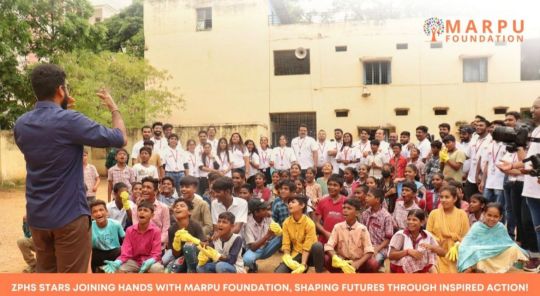
1 note
·
View note
Text
Learn how countries are supporting the SDG Agenda through rural tourism - Rural tourism and the SDGs.

Among 79 countries responding to the first survey of UNWTO member states on tourism and rural development, conducted in 2023, five SDGs emerged as the most popular when planning for or implementing rural tourism activities: SDG 8 ‘Decent work and economic growth’ is the most significant SDG for rural tourism, followed by SDG 1 ‘No poverty’, SDG 11 ‘Sustainable cities and communities’; SDG 5 ‘Gender equality’ and SDG 12 Responsible production and consumption.
At a policy level, tourism can serve as a powerful driver for achieving SDGs in rural areas.
#Rural tourism#rural areas#sdgs#globalgoals#sdg1#sdg8#sdg11#sdg5#sdg12#rural development#unwto#rural tourism activities
0 notes